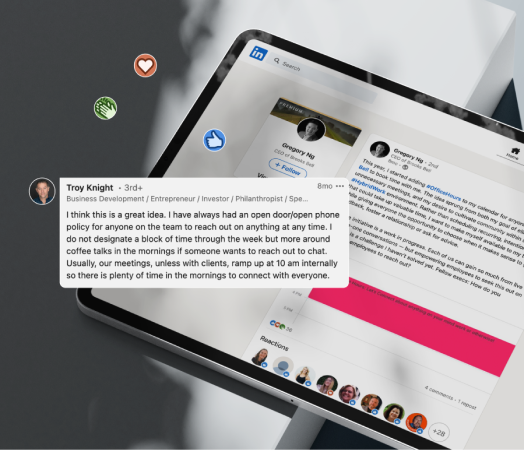Outcome-based Marketing (AKA OBM)
OBM is your B2B secret sauce — a unique marketing philosophy and approach that leads with your desired business outcome. Before we consider specific channels, tactics and deliverables, we start with your North Star business objective, and then everything else follows.
Let’s think about the big picture.
Most marketers start with channels, and then try to connect the dots back to business outcomes. This traditional approach — followed by 73% of B2B brands, according to our survey of marketing leaders — can leave you struggling and scrambling to align channels and teams in a way that demonstrates broader business impact. By flipping the script and orienting to outcomes first, you point all your channel activities and KPIs back to that North Star.
Outcome-based Marketing starts with the destination in mind and maps a strategic plan to get there guided by insights and fueled by compelling messaging and creative. It values agility and flexibility in the channel mix, moving seamlessly across earned, owned and paid media using a versatile B2B marketing toolkit.
The first step? A simple but powerful question rooted in our belief that great B2B marketing is outcome-oriented and audience-obsessed:
How might we [outcome] among [audience]?
That outcome might be related to brand awareness, lead generation or audience engagement, or a broader business outcome like category creation, product launch or IPO. Your audience might be B2B technical buyers in a specific industry or Fortune 500 C-suite executives. No matter what, your big picture goals — not just channel-specific KPIs — lead the way.
The 3 pillars of OBM
Once we know the outcome you’re driving toward and the audience you want to reach, we design custom programs around the how, what and where of outcome-based marketing. These three pillars of OBM ensure every channel tactic aligns to your larger goals.

How
The first step is determining how we’re going to achieve your desired outcome. Through methodical research and insights gathering, we’ll collaborate on a marketing strategy that gets all channels and tactics working toward the same goal.
What
Next, it’s time to develop the resonant messages that will engage key decision-makers and influencers. This is where we determine what we say and what buyers see in-market, including brand messaging, creative direction, content and storytelling.
Where
Finally, we’ll determine where we deliver the message to best reach your target audience across earned, owned and paid media. From public relations to demand generation, these channel activation plans always align to the North Star business outcome.
What outcomes are you chasing?
There’s no finite list of outcomes we can achieve together — but your goals likely map to these high-level categories that guide our approach.
Position
What makes your brand distinct? What does it provide that no one else does? Who is your target audience? Position-related outcomes aim to unearth who your brand best serves — and clarify a winning value proposition that maximizes competitive effectiveness.


Growth
Sometimes, the objective is simple: grow. Whether you’re preparing for an IPO, aiming for an acquisition or just reaching for bigger sales targets, growth outcomes aim to directly move the needle on your company’s financial goals.
Reputation
What does your audience actually think about your brand? How do you earn trust and improve your brand’s perception in a crowded market? Reputation is everything — and reputation-related outcomes ensure yours boosts the bottom line.


Engagement
Does your brand speak in a unique voice? Can audiences rely on you for information? Do stakeholders feel like they know you? Engaging your audience enables you to strengthen trust, shape industry conversations and nurture relationships — elevating your brand as a key industry player and valuable resource.

See OBM in action
Explore more outcomes and solutions from Walker Sands
Ready to drive outcomes? Let’s talk.

Senior Vice President, Growth